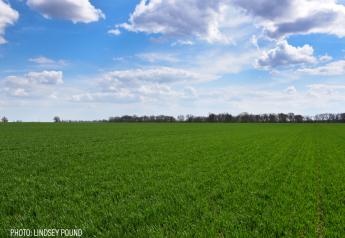First Thing Today | January 28, 2022

Old-crop soybeans score new highs... Old-crop soybean futures led price gains across the grain and soy complex and posted new contract highs overnight. As of 6:30 a.m. CT, soybeans are trading 8 to 12 cents higher, corn is 2 to 3 cents higher and wheat futures are mostly 4 to 8 cents higher. Front-month crude oil futures are around 60 cents higher, though below Thursday’s fresh seven-plus year highs, while the U.S. dollar index is more than 100 points higher.
U.S., Ukraine disagree on Russia ‘risk levels’... There’s a difference of opinion between officials of the two countries regarding the “risk levels” of a potential Russian invasion of Ukraine, a senior Ukrainian official told CNN yesterday. A 20-minute phone call between President Joe Biden and Ukrainian President Volodymyr Zelensky yesterday “did not go well,” the official said. Biden warned his Ukrainian counterpart a Russian invasion may be imminent, saying it is now virtually certain in the coming months. Zelensky, however, said the threat from Russia remains “dangerous but ambiguous,” emphasizing it is not certain an invasion will take place. The Biden administration yesterday also called for the first U.N. Security Council meeting on the situation along the Russia/Ukraine border to discuss Moscow’s recent aggressions. NATO, the defense alliance set up to promote peace and stability, is also rapidly trying to reinforce its presence in the region to help ease tensions. The Kremlin continues to deny is has any intentions of invading, despite amassing thousands of troops, tanks and equipment near its neighbor’s eastern border. Meanwhile, talks between both sides continue even as Russia criticizes proposals from the U.S. and NATO. For markets, the uncertainty remains a key driver of the rally in oil prices this week which saw global benchmark Brent prices hit the highest level since 2014.
Farmers are holding grain, betting on higher prices... Farmers are holding back grain and soybean sales in a bet that prices will continue to rise as dry weather in Brazil and Argentina stokes fears of tight global supplies. Crop sales by farmers for the current season were below a year ago in the U.S., Brazil and Argentina, which together account for more than three-quarters of global corn and soy exports, according to Archer-Daniels-Midland Company.
China tries to calm foreign banks’ economic concerns... The China Securities and Regulatory Commission (CSRC) met this week with executives at top western banks and asset managers to reassure them about the country’s economic prospects after regulatory crackdowns in 2021, Reuters reports, citing three sources familiar with the situation. Senior executives from firms including BlackRock, Credit Suisse, Fidelity International, Goldman Sachs, JPMorgan, Morgan Stanley and UBS attended the meeting. The CSRC official reassured the meeting participants China will achieve “respectable growth” in 2022. He also said China’s leadership understood the regulatory changes Beijing introduced in 2021 would affect economic growth but was determined to tolerate the pains. However, 2022 will be different year as it will have a series of significant events, including the key once-in-five-years Communist Party congress later this year, according to one source.
IMF warns of unbalanced China economic recovery... The International Monetary Fund (IMF) said China’s economic recovery “lacks balance and momentum has slowed,” citing effects of Covid-19 outbreaks on consumer spending and a property market downturn amid Beijing’s efforts to deleverage the sector. A less favorable base of comparison as well as weak consumption and headwinds from flagging real estate investment will be key drags on growth this year, the IMF said. The IMF report also noted a flurry of “seemingly uncoordinated” regulatory actions against technology firms and other sectors which is viewed in the market as “undercutting the role of private enterprises,” and urged greater transparency and predictability. IMF also called for measures to ensure fair competition between China's private firms and its state-owned enterprises, warning that such reforms are needed to deal with slowing productivity growth. Earlier this week, IMF lowered its 2022 GDP forecast for China by 0.9 point to 4.8%.
China’s land sales growth slowed sharply in 2021... Chinese government revenue from land sales climbed a modest 3.5% last year, a sharp slowdown as the country’s property developers grappled with a liquidity crunch caused by regulatory efforts to rein in the sector’s ballooning debt. The land sales growth slowed from 15.9% in 2020 and 11.4% in 2019. Sentiment in the Chinese property market, which accounts for a quarter of GDP by some metrics, has been increasingly shaken by the liquidity crisis that has engulfed some of the country’s biggest and most indebted developers.
Germany’s economy contracted in Q4... The German economy contracted during the fourth quarter of last year as a rise in Covid cases and a re-imposition of pandemic restrictions weighed on economic activity. Gross domestic product fell by an adjusted -0.7% from the previous quarter. The German economy expanded by 2.8% last year, exposing its vulnerability to supply chain bottlenecks hampering the manufacturing sector that forms its export-oriented backbone. The contraction in Europe’s biggest economy ran counter to the first estimates of fourth-quarter GDP in France and Spain, which posted on-quarter increases of 0.7% and 2.0%, respectively. France’s economy grew by 7% in 2021, the fastest expansion since 1969.
Some Senate Republicans express concern over EPA’s RFS plans... A group of Republican senators wrote to EPA Administrator Michael Regan to express concerns over the levels proposed for 2022 by the agency for the Renewable Fuel Standard (RFS) and the proposed rejection of all 65 pending small refinery exemptions (SREs). The lawmakers said the EPA proposal “runs counter to congressional intent” relative to the SREs and said the 2022 Renewable Volume Obligations (RVOs) proposed do “not reflect market realities and is likely to further raise costs for refiners — especially small and independent refiners — and therefore American consumers and the economy.” The lawmakers noted the Clean Air Act allows for SREs to help small refiners in cases where complying with the mandates would cause them “disproportionate economic hardship.” The lawmakers argued the proposed 2022 RVO levels are “likely baking in elevated blending mandates for years to come.” Those signing the letter included Sens. Shelley Moore Capito (R-W.Va.), John Barrasso (R-Wyo.), and James Inhofe (R-Okla.), all repeated critics of the RFS program. EPA is taking public comments on the proposed RFS levels through Feb. 4 and on the proposal to deny all pending SREs through Feb. 7.
Vilsack hopes to soon announce nominee for USDA’s top trade position... When asked on AgriTalk yesterday about the timeline for naming an Undersecretary for Trade and Foreign Agricultural Affairs nominee USDA Secretary Tom Vilsack said, “we have a person which we have asked to take on that responsibility. He's going through the… vetting process.” Vilsack said the delay in rolling out a pick boils down to the extensive vetting process, a refrain he has lamented before. “There’s a lot of questions concerning his business dealings, and we’re just going through the process of trying to make sure ethically… he's not going to have any issues or any problems,” he remarked, adding, “it takes a long time, unfortunately, and so that's where we are.” Vilsack stressed that “we have a great team at the [Foreign Agricultural Service], and they’re doing a fantastic job,” and that key work on trade issues is “getting done.” He added that “aggressive” efforts by FAS to boost ag exports continue, and said he expects 2022 ag exports to exceed the record seen during 2021.
Chip delays to continue... The Biden administration concluded that a global semiconductor shortage will persist until at least the second half of this year, promising long-term strain on a range of U.S. businesses including automakers and the consumer electronics industry.
Limited premium in February live cattle... Live cattle eased yesterday amid the sharply higher U.S. dollar. But seller interest was limited buy the modest premiums the February and April contracts hold to the cash market. This week’s cash cattle trade is virtually wrapped up, with prices generally about steady with week-ago. Unless funds are spooked into actively liquidating long positions to close the week, seller interest in futures should be limited by their small premiums to cash.
Outside markets overshadow fundamentals for hogs... Hog futures fell sharply on Thursday, largely due to the surging U.S. dollar, which triggered fund long liquidation. That overshadowed strong weekly export sales and a firming CME lean hog index. Speculative money flow will likely play a big role in today’s price action, which will determine if hog futures finish higher or lower for the week after deferred contracts scored new highs earlier midweek.
Overnight demand news... Japan purchased 22,410 MT of Australian milling wheat. The Philippines purchased around 50,000 MT of Australian feed wheat.
Today’s reports
- 2:00 p.m. Egg Products — NASS
- 2:00 p.m. Peanut Prices — NASS
- 2:30 p.m. Commitments of Traders — CFTC






